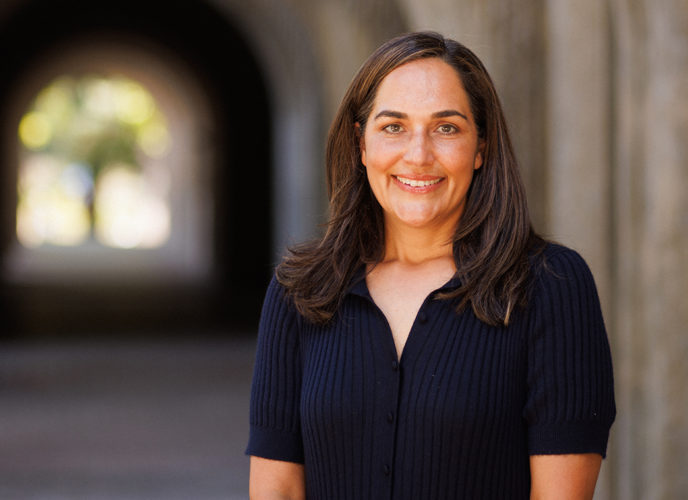Jennifer M. Chacón: Bruce Tyson Mitchell Professor of Law
Immigration Law Expert Comes Full Circle
Becoming a law professor at her alma mater was not something that Jennifer M. Chacón predicted would make her emotional. But that’s what happened when she returned to Stanford University this fall as a member of the law school faculty.
“This is where I first thought that I might be a professor, and there’s something really moving about coming back and being a professor in the space where I had the audacity to think that I could go into teaching,” says Chacón (BA ’94) of her return to Stanford nearly three decades after graduating with a degree in international relations.

This is not Chacón’s first time teaching at Stanford. She was a visiting professor at the law school from 2015 to 2016, after serving a similar role at Harvard. An expert in immigration law as well as constitutional law, criminal law, and critical race theory, she has also held appointments at UC Berkeley School of Law, UCLA School of Law, UC Davis King Hall School of Law, and UC Irvine School of Law.
But joining Stanford as a full-time faculty member feels different, says Chacón, who was recently named the Bruce Tyson Mitchell Professor of Law. It’s as if she’s no longer “auditioning,” she says, and has come home academically.
Chacón’s professional journey started long before she enrolled at Stanford in 1990. Raised in the border city of El Paso, Texas, by a Mexican-American father and an Irish-Italian American mother gave her a unique perspective on U.S. immigration policies.
“Growing up on the U.S.-Mexico border, I saw the hardening of that border, increasing militarization of that space, so I became really interested in these questions of race and space and immigration and migration control,” Chacón says.
When Chacón first arrived at Stanford as an undergraduate, she was not sure whether a legal career was right for her. Inspired by classes on civil rights and constitutional law, however, she decided to pursue a law degree.
She enrolled at Yale Law School, where she thought she would study international law with the goal of one day becoming a law professor. She soon learned she was most interested in how laws affect people’s movements within countries and across borders. But studying under a faculty that lacked diversity made Chacón second-guess whether she could thrive in the law school environment.
“It was alienating in a lot of ways to go to a space like that,” she recalls. “I thought, ‘Well, maybe this isn’t for me.’”
Then Chacón landed a clerkship for the Honorable Sidney R. Thomas of the 9th Circuit. She clerked for Judge Thomas at a time when a number of legal challenges to the immigration laws of the mid-1990s were working their way through the appellate courts.
“It was really critical,” she says. “I got to see lawyers arguing before the appellate court. I read a lot of briefs. I think that really helped me to get a sense of what good lawyers did and how judges reasoned and made decisions.”
Post-clerkship, Chacón practiced at Davis Polk & Wardwell in New York before beginning her teaching career in 2004 at UC Davis School of Law. She calls the experience “a real gift” because she was able to work with Kevin R. Johnson, a legal scholar who specializes in immigration.
Following her time at UC Davis, Chacón joined the law faculty of UC Irvine in 2009—the year the first class of students entered that law school. Helping to build the program allowed Chacón to work closely with students and gave her insights into law school administration, culture, and teaching.
UC Irvine law professor Stephen Lee (BA ’98) taught a course with Chacón, and they co-authored a forthcoming book from Stanford University Press that examines immigration policies during the administrations of presidents Barack Obama and Donald Trump.
“She writes with her whole heart,” Lee says. “She both asks and answers really tough questions, but she also tries to ask questions that go to the core of the kinds of human suffering that we see every day in America, but especially at the border.”
From UC Irvine, Chacón headed to UCLA School of Law to work with its critical race studies faculty.
“It really helped me as a scholar,” she says of the experience. “I could focus on my work in conversation with people who are doing sophisticated and exciting and important scholarship on issues of race, inequality, and civil rights.”
In 2021, Chacón received UCLA’s Professor of the Year award. Laura E. Gómez, JD ’92 (MA ’88/PhD ’94), was also a member of the faculty there.
“She is a tremendous scholar,” Gómez says. “In particular, her work on the nexus of criminal law and immigration law has really changed how we think about fundamental precepts in those fields.”
When the coronavirus pandemic hit in 2020, Chacón wanted to be closer to her family, some of whom had moved to Northern California. So, she and her husband, also a law professor, accepted positions at UC Berkeley. Chacón describes her year there as “lovely” but ultimately she decided to move on to Stanford.
Now that she’s returned to her alma mater, Chacón hopes to address the pervasive inequalities in higher education and has begun to ponder her role in navigating what she calls a “resource-rich” institution such as Stanford.
“How do I ensure that Stanford’s resources are deployed in ways that seek to address rather than exacerbate those kinds of inequalities?” she asks. “How do we build educational spaces that are open, accessible, and inclusive?” SL
Nadra Nittle, an education reporter for The 19th News, was previously a staff reporter for Vox Media and the Long Beach Press-Telegram.
